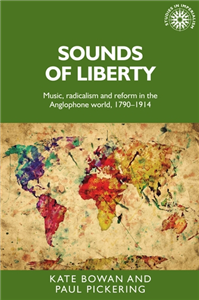Sounds of liberty
Music, radicalism and reform in the Anglophone world, 1790–1914
by Andrew Thompson, John M. MacKenzie, Kate Bowan, Paul A. Pickering
Description
More Information
Rights Information
Albania, Algeria, Angola, Argentina, Armenia, Australia, Austria, Bahrain, Belgium, Belize, Benin, Bolivia, Bosnia and Herzegovina, Botswana, Brazil, Bulgaria, Burkina Faso, Burundi, Cameroon, Canada, Cape Verde, Central African Republic, Chad, Chile, China, Republic of, Colombia, Comoros, Congo [DRC], Congo, Republic of the, Costa Rica, Ivory Coast, Croatia, Czech Republic, Denmark, Djibouti, Ecuador, Egypt, El Salvador, Equatorial Guinea, Eritrea, Estonia, Ethiopia, Faroe Islands, Finland, France, French Guiana, Gabon, Gambia, Georgia, Germany, Ghana, Greece, Guatemala, Guinea, Guinea-Bissau, Guyana, Honduras, Hong Kong, Hungary, Iceland, India, Indonesia, Iran, Iraq, Ireland, Israel, Italy, Japan, Jordan, Kazakhstan, Kenya, Kuwait, Latvia, Lebanon, Lesotho, Liberia, Libya, Lithuania, Luxembourg, Macau, China, Macedonia [FYROM], Madagascar, Malawi, Malaysia, Mali, Malta, Mauritania, Mauritius, Mayotte, Mexico, Mongolia, Montenegro, Morocco, Mozambique, Namibia, Netherlands, New Zealand, Nicaragua, Niger, Nigeria, Norway, Oman, Pakistan, Panama, Paraguay, Peru, Philippines, Poland, Portugal, Puerto Rico, Qatar, Reunion, Romania, Russia, Rwanda, Saint Helena, Sao Tome and Principe, Saudi Arabia, Senegal, Serbia, Seychelles, Sierra Leone, Singapore, Slovakia, Slovenia, Somalia, South Africa, South Korea, Spain, Sri Lanka, Sudan, Suriname, Swaziland, Sweden, Switzerland, Syria, Taiwan, Province of China, Tanzania, Thailand, Timor-Leste, Togo, Tokelau, Tunisia, Turkey, Uganda, Ukraine, United Arab Emirates, United Kingdom, United States, Uruguay, Venezuela, Vietnam, Western Sahara, Yemen, Zambia, Zimbabwe, South Sudan, UK, Aus, NZ & UK Territories, North America, Africa (all African countries)
Endorsements
This book explores the role of music in the transmission of political culture over time and distance, focusing on radicals and reformers committed to the struggle for a better future. It follows in the footsteps of relentlessly travelling activists - both women and men - and brings to light the importance of music-making in the lived experience of politics. It shows how music encouraged, unified, divided, consoled and reminded; and it helps to understand better the affective register of the political and cultural life of those who composed, performed and consumed it. Throughout the long nineteenth century the sounds of liberty resonated across the Anglophone world: in the faint strains of 'rough music' played on the streets of Toronto and the 'middle-brow' performances within the walls of a secularist coven in Christchurch; in cacophonous election songs swirling around the hustings in Glasgow and Sunday afternoon chamber music concerts in the heart of radical Holborn; in defiant anthems blaring slightly out of tune on picket lines in Broken Hill and in hymns warbled by labour church choirs in Winnipeg. The first section examines songs; the second examines music's place in the public sphere where people - individually and collectively - made music when marching, electioneering, celebrating and commemorating, as well as striking, rioting and rebelling. The final section explores music-making within the walls of a range of associations and institutions including the difficult and often destructive part it played in European interaction with indigenous people.
Reviews
This book explores the role of music in the transmission of political culture over time and distance, focusing on radicals and reformers committed to the struggle for a better future. It follows in the footsteps of relentlessly travelling activists - both women and men - and brings to light the importance of music-making in the lived experience of politics. It shows how music encouraged, unified, divided, consoled and reminded; and it helps to understand better the affective register of the political and cultural life of those who composed, performed and consumed it. Throughout the long nineteenth century the sounds of liberty resonated across the Anglophone world: in the faint strains of 'rough music' played on the streets of Toronto and the 'middle-brow' performances within the walls of a secularist coven in Christchurch; in cacophonous election songs swirling around the hustings in Glasgow and Sunday afternoon chamber music concerts in the heart of radical Holborn; in defiant anthems blaring slightly out of tune on picket lines in Broken Hill and in hymns warbled by labour church choirs in Winnipeg. The first section examines songs; the second examines music's place in the public sphere where people - individually and collectively - made music when marching, electioneering, celebrating and commemorating, as well as striking, rioting and rebelling. The final section explores music-making within the walls of a range of associations and institutions including the difficult and often destructive part it played in European interaction with indigenous people.
Author Biography
John MacKenzie is Emeritus Professor of Imperial History, Lancaster University and holds Honorary Professorships at Aberdeen, St Andrews and Stirling, as well as an Honorary Fellowship at Edinburgh.; ;
Manchester University Press
Manchester University Press is a leading UK publisher known for excellent research in the humanities and social sciences.
View all titlesBibliographic Information
- Publisher Manchester University Press
- Publication Date March 2019
- Orginal LanguageEnglish
- ISBN/Identifier 9781526138330 / 1526138336
- Publication Country or regionUnited Kingdom
- ReadershipGeneral/trade
- Publish StatusPublished
- Dimensions234 X 156 mm
- SeriesStudies in Imperialism
- Reference Code11923
Manchester University Press has chosen to review this offer before it proceeds.
You will receive an email update that will bring you back to complete the process.
You can also check the status in the My Offers area

Please wait while the payment is being prepared.
Do not close this window.



